-
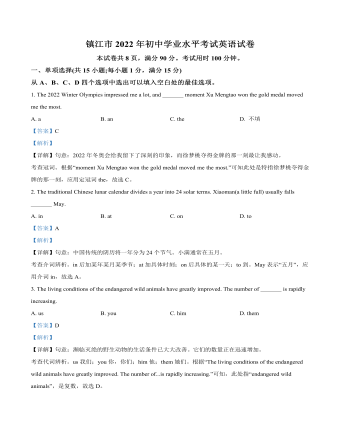
2022年江苏省镇江市中考英语真题(解析版)
Lastsummer, I was holding the net when Grandpa asked me ____19____ I couldhelp him teach Frank how to play chess. I said no because I wanted to catchfish. Grandpa had been the one who’d taught us how to catch fish, but then the ____20____ made him stay behind.
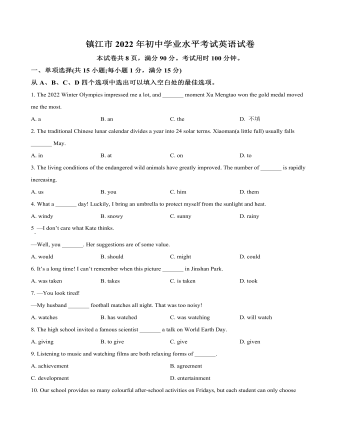
2022年江苏省镇江市中考英语真题(原卷版)
The fantasticman-made “forest” is a Singapore landmark. It is made from steel and concrete(水泥) covered in localflowers and plants. At night, 18 solar-powered tree-like towers which get theirenergy from the sun often light up the city.
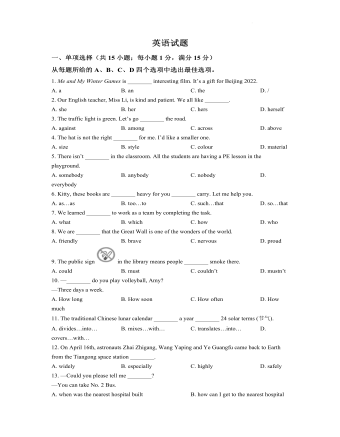
2022年江苏省连云港市中考英语真题(原卷版)
There was an old oak tree in the garden. Holly’sfather wanted to cut it down and build a new office there. Holly felt sad anddidn’t agree. She moved into the old tree house which was her favourite place in the world.One day, it rained all night.
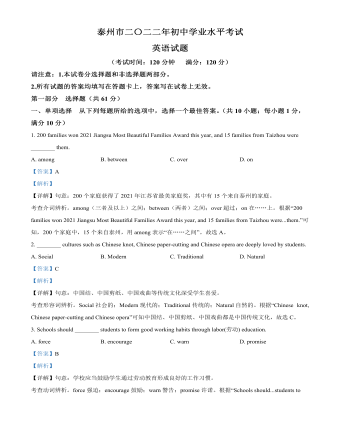
2022年江苏省泰州市中考英语真题(解析版)
If youthink you have walked into a library with a ____11____ likethat, you are exactly wrong. ____12____, you’ve entered the workplace of CourtneyHolmes, known as the Storybook Barber (理发师).
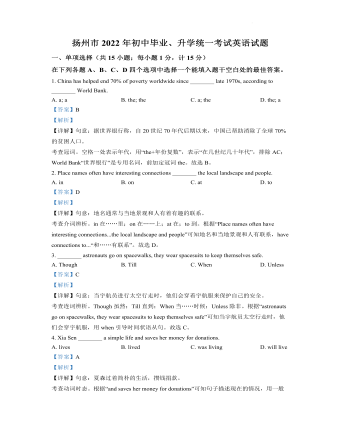
2022年江苏省扬州市中考英语真题(解析版)
Late onenight, Gulliver received a warning that some nobles wanted him killed. Even theemperor of Lilliput wanted to give him less food to save ___16___. It was true Gulliver was very expensive.
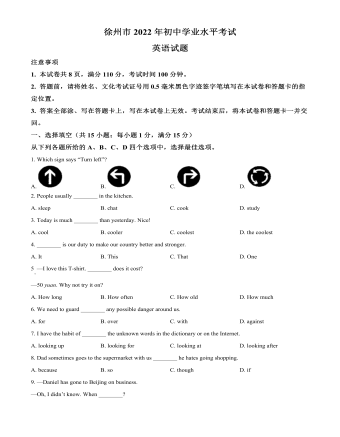
2022年江苏省徐州市中考英语真题(原卷版)
Dudiscovered his interest in folding paper in his childhood. After Du went tocollege in 2017, he had enough time to take the hobby seriously. He learnedfolding from online teachers and experts. Later he copied patterns from books.He spent almost three years improving his basic skills by making copies ofother artists’ designs. Then he made his own creations.
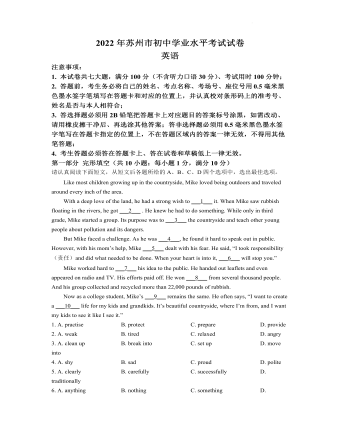
2022年江苏省苏州市中考英语真题(解析版)
For Yang, one of the long-expected activitiesduring the Spring Festival is to take photos with family members. On the earlymorning of the second day of the Chinese New Year when the whole family reunite,he would dress up and wait for the photo to be taken.
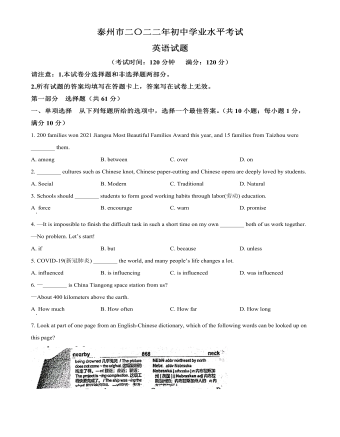
2022年江苏省泰州市中考英语真题(原卷版)
Shuttlecock exercise doesnot require equipment(装备) and is perfect for people to perform at home.Liu Genghong helps you to keep going until the last minute, and you can burnyour fat fast.
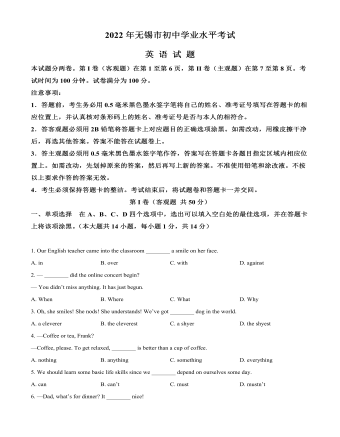
2022年江苏省无锡市中考英语真题(原卷版)
Studying is not always the most interesting taskwithin your day, but it is a necessary one. Even though it is required,everyone has got bored at one time or another while studying.
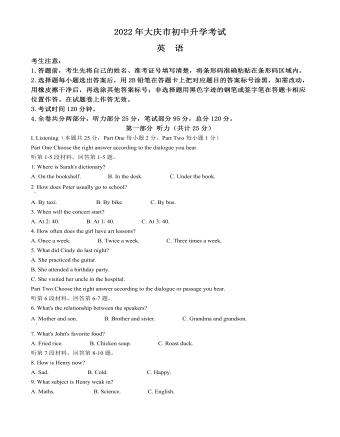
2022年黑龙江省大庆市中考英语试题(原卷版)
At first, I wanted to give up the job becausegetting up too early in the morning made me unhappy. I’ll never forget howtired I felt on my first day, but I’ll never forget sitting together andtalking about our days with my workmates for the first time either. Suddenly, Ifelt good to be a member of them.
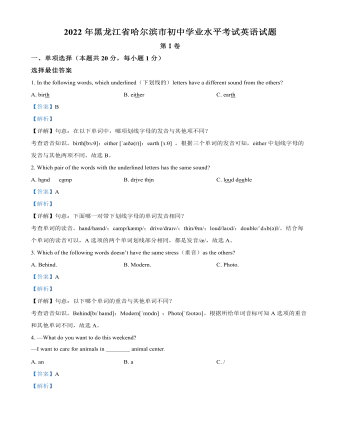
2022年黑龙江省哈尔滨市中考英语真题(解析版)
At the age of seven, I started school in London.There I met a ____21____,Mr. King. He influenced my whole life. Mr King taught me maths. He washumorous. Sometimes, he told us funny stories. So his lessons made us ____22____.
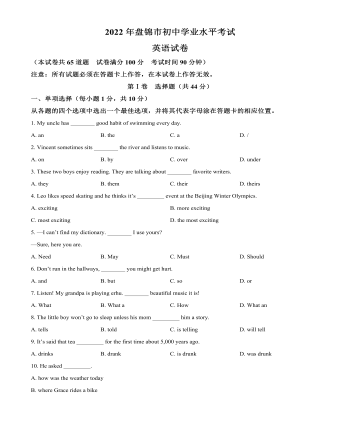
2022年辽宁省盘锦市中考英语真题(原卷版)
“Her daughter passed away a few days ago. Now,she can’t do the same things she used to do with her daughter. She doesn’t knowwhat to do. Even little things like making dinner and cleaning the house areharder for her to do now. Maybe you can think of a way to help her,” her mothersaid.
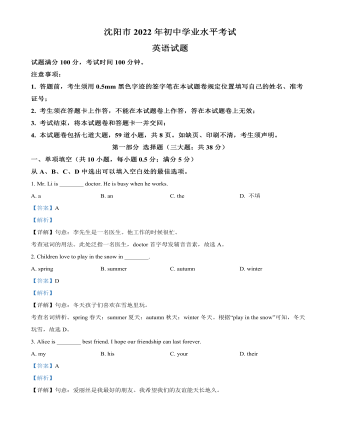
2022年辽宁省沈阳市中考英语真题(解析版)
Excitedly, he went to draw water(抽水), ___15___ he couldn’t pump water no matter how hard hetried. He sat on the ground ___16___.Just at that time, he saw a small bottle with a cork(瓶塞).
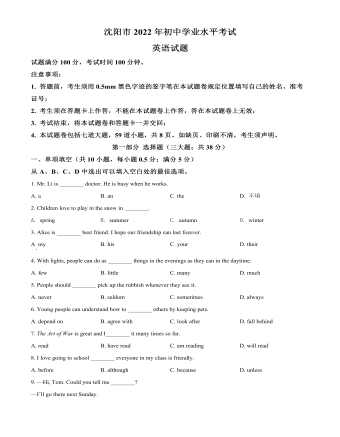
2022年辽宁省沈阳市中考英语真题(原卷版)
For a long time, I guarded the garden of peaceand quiet. When the children followed me into the garden, I would expect themto be out of sight (视野). And I would hand out tasks.
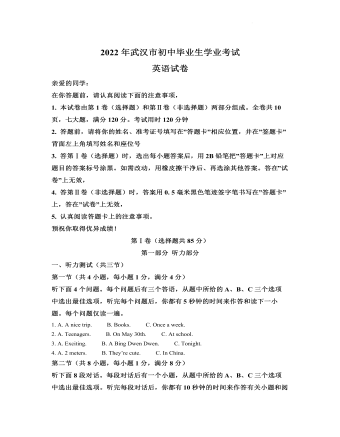
2022年湖北省武汉市中考英语真题(原卷版)
The December day started like any other. Papacame back with his boat full of fish. Mama made breakfast for the family.Seven-year-old Joonas was doing his homework, while his two little brothers ranaround the yard.
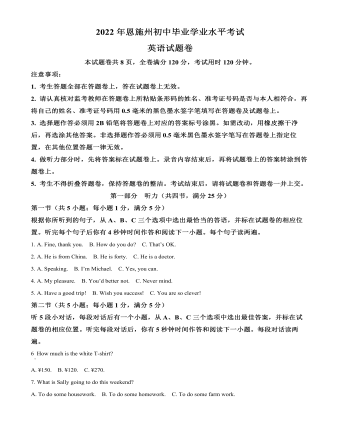
2022年湖北省恩施州中考英语真题(原卷版)
Once, herfather took her to the kitchen. He asked Jane to take a potato, an egg ____11____two spoons of tea leaves. Jane was ____12____, and asked her father, “Doyou want me to cook?”
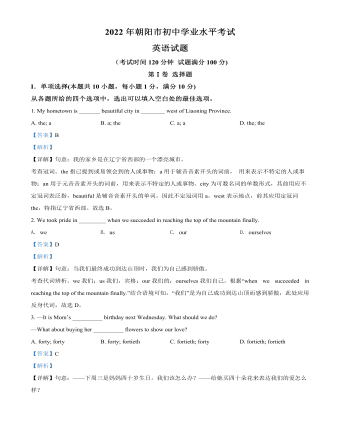
2022年辽宁省朝阳市中考英语真题(解析版)
There wasa stone lying in the mountains for a long time. He had a dream—one day he couldfly up into the sky ___11___ a bird. When he told his dream to his friends,they all laughed at him.
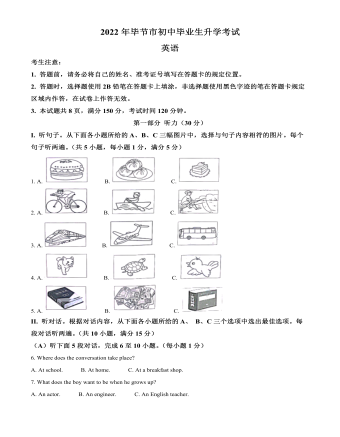
2022年贵州省毕节市中考英语真题(原卷版)
Mr. Zhang was a cook in Canada. He ___11___in Guangzhou, and he learned to cook in Hong Kong. He moved to Canada for workwhen he was 26 years old. Everything was good till COVID-19(新冠病毒)brokeout. Last year, he returned to China because the economy(经济)inCanada began ___12___ down.
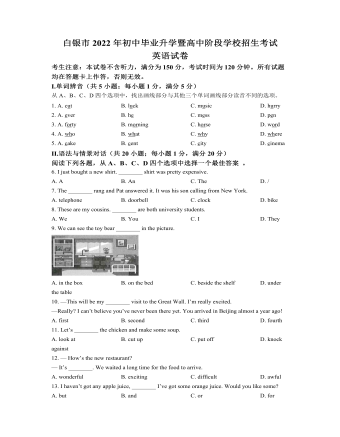
2022年甘肃省白银市中考英语真题(原卷版)
Chinese taikonauts Zhai Zhigang, Wang Yaping andYe Guangfu carried out the Shenzhou-13 spaceflight mission (任务) that started on Oct. 15,2021. This mission lasts 6 months, which was also a national record.
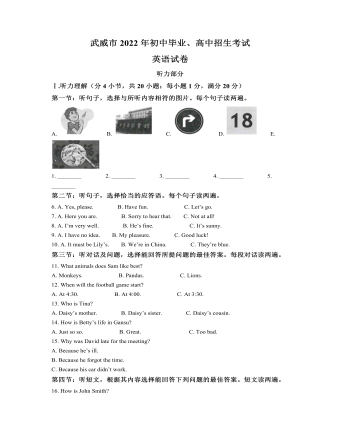
2022年甘肃省武威市中考英语真题(原卷版)
All thefamily—my grandparents, my parents, my aunt and uncle, my cousin, my sister andI— ___22___ the turkey. However, turkey is not the easiestthing to ___23___. It takes a lot of time to prepare and a lot ofwork to cook…and there are a lot of chances for things to go wrong.

